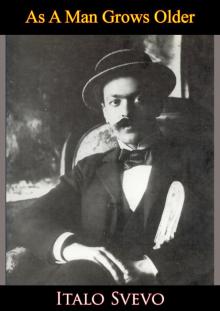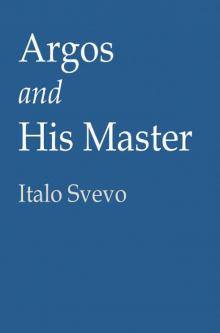- Home
- Italo Svevo
A Life Page 5
A Life Read online
Page 5
Ballina treated him with affected respect but derided him. One day, in the stress of work, Miceni had rebuked him for slowness, and the other did not forgive this. When Miceni tried to justify his outburst, Ballina laughed in his face.
“You seem to think the bank’s business is your very own! I can understand Signor Maller or Signor Sanneo bossing us, but not someone who’s just head of the correspondence department for a fortnight.”
Even Alfonso noticed that Ballina must be a happy man, for he obviously enjoyed his mechanical labour, though unwilling to admit it. Ballina called himself Head of the Information Office out of vanity, though actually he was its only member. He himself asked for information, copied it out and filed it away alphabetically inside a big cupboard. He had nothing pending as his work did not require it, and had a habit of staying at the office many more hours than he needed to. He would clean bone cigarette-holders, of which he had many, mend locks, sharpen razors, and shave in the office when he did shave. A great smoker, he always had a big pile of tobacco on oiled paper in a drawer. It was a mixture of different kinds, scented by some root which gave his room a strong smell of resin. That room was his real home: he had introduced his own little comforts, even nailed a bit of leather over his straw seat for greater comfort. One drawer of his desk was set aside exclusively for food and drink; bread, sometimes butter, often a bottle of beer, always a little flask of grog which he offered to any friends who came to pay a visit. Obviously he was not very cosy in his other home. The room where he slept was so small, he said, that it was filled by his bed and a cupboard, and a chair cluttered up the door. As it was essential, he had thought up an ingenious mechanism.
“I tied the chair to a rope which I attached to the top of the door jamb after passing it through a hook on the wall. When the door opens the chair goes up and leaves my entrance clear; when the door’s closed I find the chair beside me and can sit down without moving a step.”
There was perhaps some exaggeration in this but some truth as well. One day in front of Alfonso he handed over the keys of this room of his to one of the bank’s porters, telling him to find him a new room and to take his few belongings there. His real home, for which he had a womanly affection, was his office.
For all his sedate appearance, Ballina had got through a small legacy which had come to him, he said, before he understood the value of money. For one short year of pleasure he had spent many in poverty and was to spend many more “probably till I die” he would say—while if he now had had even a small sum, he could have done better for himself, being so ingenious. As things were he had always worked for others, in a factory for cigarette-holders, another for vinegar, as a salesman in an exhibition, in a shop that sold walking-sticks and so on, always for bad pay. Eventually he had landed up at Maller’s where he had become so fond of the work that he was resigned to a poor salary.
The clerk for French correspondence, White, usually took the lead in conversation. He came from an English family transplanted to France and had been sent away from Paris by relations who feared he would get through his whole inheritance in gambling and in a gentlemanly life of ease. He had come into the bank as a correspondence clerk for French, first working under Sanneo, then independently after a violent quarrel with him. Maller realized that the two would not get on and separated them, not wanting to force the submission of White, who was protected by an old banker friend; his work dealt almost entirely with stocks and shares, about which he seemed to know a great deal. Apart from that he was a good employee and a quick, though rather disordered worker. Always smartly dressed, he was squat, with an uncertain gait and a bent back, and the combination of dandy’s clothes on an old man’s figure gave him an odd look. But he had very regular features; spectacles improved his brown face and made it look more sedate. In Trieste, which he considered provincial, he had acquired a passion for shooting, and his skin bore traces of many hours spent in the sun. He worked with great speed and, when he had nothing to do, would take a liberty which no other employees dared to and not come to the office.
An intelligent blagueur, he was a good talker; he read all the new French novels and spoke of them in a way that made his observations sound original. He liked few modern novels; he realized their merits as far as Alfonso could judge, but did not always take to them; finding one thing too much or another too little, he would end by criticizing. He shocked Alfonso’s tendency to idolatry by speaking with contemptuous familiarity of the most famous authors: “So and so gave his novel a certain title to attract sales, another wrote filth for the same end, a third with a reputation for great virtue, and much read by young ladies, was a rogue who beat his mother.”
He offered to lend Alfonso books, always forgot to bring them, and then one evening took him home to fetch them. He lived in the centre of town in a spacious first-floor apartment. Crossing a small entrance hall, they entered a big room furnished only with a table and a few chairs; the windows were curtainless. With all that light and space the room looked too bare.
A woman dressed in a pink dressing-gown, fair, with features that were almost too regular, was sitting by the window working at a loom.
“My wife,” said White in French, introducing them: “My friend, Monsieur Nitti.”
The lady made a move to rise, impeded by cloth hanging from the loom. The introduced couple looked at each other, he murmuring a complimentary word, she waiting for him to go before settling back at her work. White had hurried into a nearby room, and Alfonso, bothered at finding himself mute with another mute, gave a bow which was returned slightly, and followed.
The bedroom contained two beds next to each other, a cupboard and some chairs. White’s books, about twenty, were lying in disorder on the floor, under the only window, also curtainless. There was not a picture on the walls; only the bare minimum; they looked like two rooms furnished as temporary shelter, not a home.
As he went out with White, the same scene with the woman was repeated. She got up just as carefully, her face calmly indifferent, and again the piece of cloth threatened to fall.
In surprise Alfonso asked White: “How long have you been married?”
White gave a roar of laughter.
“Married? For a long time, but with this hand!” and he raised his left.
A woman holding a child now entered the room.
“My son!” cried White, touching the baby with his stick. “He’s rather like me, holds himself in the same way.”
The baby was leaning his little forearms on the shoulders of the woman, who was holding him too high and so making him bend over.
“We’re more frank than you people. I do everything openly, so my relatives here loathe me, but I don’t care a jot about them.”
He spoke Italian with ease, though obviously translating from French.
One day, while White was in Alfonso’s room, Annetta came in with a friend whom she was showing round the bank. She greeted White as if she knew him well, introduced him to her friend and started up a lively chatter with him in French. As she made her farewells, she said to Alfonso with a polite smile:
“You, too … it would give me great pleasure.”
Alfonso bowed without understanding.
Annetta was in mourning for the death of a distant relative whom she had not even known. She looked better in black than in light colours, as it made her slimmer; her eyes seemed even more expressive.
“What did she say to me?” Alfonso asked White.
“She invited me to her home and invited you, too,” replied White carelessly. “I’m not going.”
“Nor am I!” affirmed Alfonso resolutely.
On Sanneo’s return he greeted the clerks more coldly than when he left. As soon as he re-entered the bank he at once went back to being their boss, while on leaving he had bid them a leisurely goodbye as a colleague.
Miceni spent the first day in Sanneo’s room handing over work in progress. Then things went back to their usual routine, and Miceni was the only one u
nable to return to his. He kept walking stiffly round the bank, idle because he had so buried himself in Sanneo’s work that he had neglected his own. He bemoaned his fortnight of almost sovereign rule, and praised the directors’ behaviour to him; but what he praised more than anything else was Sanneo’s job.
“This is quite different,” he would exclaim with contempt, pointing to his papers. “No variety, no initiative!”
He was the only one in the room to complain of leading a penpusher’s life. Alfonso, idle because Sanneo had not yet given him any letters to do, was meanwhile enjoying de Musset’s poetry.
Very soon it got round that relations between Miceni and Sanneo had become strained, for which everyone blamed Miceni.
Sanneo had a habit of jotting the initials NB for nota bene on any letter for which he had special instructions, so that the clerk it went to had to go and ask him for them before replying. Ballina, who was always inventing special words and phrases established that to NB meant to visit Sanneo and ask him to explain what his sign meant.
Now Miceni, either because he considered he did not need all these explanations or just from laziness, often omitted to do what Ballina called to NB; and even more often, after receiving instructions he modified them, preferring his own ideas to Sanneo’s. The latter attributed all this to oversights and merely sent him back the letters with orders to change them; Miceni on his side tried to avenge himself by writing out the letters carelessly, muttering the while: “He’ll have to re-do them altogether in the end!”
This enmity might have remained latent for a long time had not Miceni in a moment of anger shown Sanneo his feelings openly.
At the peak working hour in the evening Sanneo came across a letter written by Miceni which was quite different from what he had told him to do; he also remembered that Miceni had not responded to his NB for that particular letter.
He rushed over to Miceni’s room, in great agitation, because he suspected the mistake to have been done on purpose.
“This letter can’t go,” and he shook it in a nervous hand. “I want it written differently, didn’t you see my NB? Show me the original.”
Seeing that Miceni was moving very slowly to gain time, he took up the pile of letters, scattered them over the table and drew out the offending page.
“Don’t you see this NB?” he yelled in a fury.
It was difficult not to see it in fact. In red pencil, the first leg of the N ran diagonally across the front; the second was shorter but only because there had not been enough space on the page; the B went right off the paper and lacked one of the humps.
“I saw it,” shouted Miceni, annoyed at being rebuked in front of Alfonso and White. “I’d already asked for instructions about other letters, and when this came, it was too much of a bother to go round to you and ask for explanations which I expected to find superfluous as usual.”
His voice was becoming strident; once the rage long smouldering inside him burst out, it made him say everything that came into his head. “Ah! So it’s like that, is it?” yelled Sanneo, after a second of surprise at this reaction. Then he tore up the letter. “D’you think I put those NBs in for fun? Re-do this letter at once!”
In a voice trembling with emotion he gave his instructions.
“As I can no longer trust you,” he then added, yelling again, “in future you will always hand me the incoming letter together with your reply. And remember if you behave like this again, I’ll see Signor Maller and ask him to tell you what I think of you.”
Miceni had already begun writing, but at this he shrugged his shoulders almost imperceptibly, with a smile of open provocation.
It was said of Sanneo that he shouted until he met opposition; certainly he did not like quarrels and avoided them as much as he could. Pretending not to see Miceni’s gesture, he left.
Miceni was so red in the face that flushed skin showed through his black moustaches; his pen was heard scratching over the paper more loudly than ever. On finishing the letter, he flung his pen violently on to the table and cried: “He wants me to do what White did!”
After delivering the letter to Sanneo he explained to Alfonso how he could free himself of Sanneo; the latter had enough on his hands with correspondence for Vienna and Italy; Sanneo could be left the correspondence with Germany.
“Signor Maller knows my worth.”
On the following days Sanneo was obviously acting with studied moderation, for he never rejected one letter by Miceni, who on his side asked him for all instructions that he was supposed to, as indicated by Sanneo’s few NBs.
“So that’s the way he should be treated to make him behave, is it?” Ballina cried.
White congratulated Miceni and said he must realize that all he’d done was imitate him weakly.
“The next stage won’t be long now,” replied Miceni triumphantly, after revealing his intentions.
Ballina protested in the name of justice.
“Now that he treats you decently you’d be wrong to cause any more rows.”
Ballina had never had the courage to react against any superior for fear of losing his job; he was the worst treated of all the clerks in the correspondence department and envied those who said what they thought. White tried to calm Miceni too, not much liking to see his own actions copied by others.
But Miceni would not listen to reason. In his impatience to carry his rebellion through, he was incapable of waiting for a propitious occasion, though he realized one could not be long in coming, since Sanneo had periodic days of great irritability when he easily let himself go and said things which even his directors had to criticize. If Sanneo gained an easy victory, it would be Miceni’s fault.
One Sunday another clerk in the correspondence department came with an order, in writing as usual, to write out a letter at once to a client firmly demanding payment for the deficit on some deal in stocks and shares. Although he knew that the order came from Sanneo, Miceni did not do it and wanted to leave, declaring that he did not work on Sundays. The clerk repeated this reply to Sanneo, who lost his temper. He rushed off to Miceni, and without asking for any explanation, foaming at the mouth, yelled: “Write this out at once!” and flung the admonitory letter on the table.
“Today’s Sunday,” replied Miceni, livid and trembling; his courage was forced, for he was a coward by nature. “I don’t work on Sundays.”
It was Sanneo who had first made the correspondence department work regularly on Sunday mornings, even before he became head of it, but urgent matters had always been dealt with then, work which could not be delayed.
“Oh! So it’s like that, is it?” asked Sanneo quietly. He had become calm again from one moment to the other, and strode quickly off as if not wanting to leave Miceni time to modify his answer.
Shortly afterwards he sent for Alfonso.
“Please, Signor Nitti, would you do this letter?”
He spoke with unusual gentleness and in a voice full of emotion. For a letter of a few lines he kept Alfonso a full quarter of an hour; first he explained its purpose and then dictated it word by word.
“So now it’s up to me!” said Alfonso to Miceni.
Miceni frowned.
“If he finds it so easy to get someone to work on Sundays, anyone who refuses is bound to be in the wrong.”
And he left, in order to assert that he could not work as he had something urgent on elsewhere. After having done what he had so long promised himself to do, he was now clearly worried.
Sanneo re-read the letter written out by Alfonso, put in a few commas which he had not pointed out and which Alfonso, with his exactness as a copyist, had not dared add, and with a smile of approval said: “Excellent! Please be kind enough to put it on Signor Cellani’s desk.”
Never had he been so polite.
At nine on Monday morning Miceni was called in by Signor Maller. Alfonso learnt what took place in the managing director’s office partly from White and partly from Miceni himself.
Miceni had ent
ered with a loud greeting and a bow which also included Cellani, who was present. White, who was about to leave the room, stopped to listen.
“Signor Sanneo is complaining about you,” said Maller very seriously. “Why did you refuse to write that short letter yesterday?”
“I thought it might be done on Monday,” replied Miceni. At the last moment he had decided to give his reply a form of doubt.
“But if Signor Sanneo ordered it to be done on the Sunday”—here Maller raised his voice—“it must be done on Sunday.”
The partial repetition of Miceni’s phrase made the reply sound harsher.
“Anyway,” objected Miceni in the tone of one falling back on the other’s goodness of heart, “it was wrong of Signor Sanneo to make me work on a feast-day.”
“I myself had given orders for that letter to be written and sent yesterday,” replied Signor Maller severely.
Miceni made inarticulate sounds; there was nothing more to say.
White took pity on him and left the room.
The rest of the scene was reported by Miceni, who left Maller’s room as gaily as if he were quite sure things would work out in his favour.
He tried to arouse admiration. He said that when the verdict went against him anyone else would have taken the thing as lost, while he had been able to change his ground. He had brought up old incidents already known to his employers for which Sanneo had been rebuked; then he had talked contemptuously—thinking more disrespect for Sanneo could do him no more harm—of those NBs which merely made a confusion of the letters and upset the clerks.
“Signor Sanneo’s behaviour to employees isn’t right, and I just won’t accept it.”
He had re-acquired all his self-confidence.
Then he was called back to Signor Maller’s room, and came out looking utterly different. Alfonso understood and asked nothing. Miceni gave a little laugh which was intended to be sarcastic; then with a decisive movement he put his hat and working jacket on his desk and said: “I didn’t expect this at all.”

 A Life
A Life As a Man Grows Older
As a Man Grows Older Argos and His Master
Argos and His Master The Nice Old Man and the Pretty Girl
The Nice Old Man and the Pretty Girl